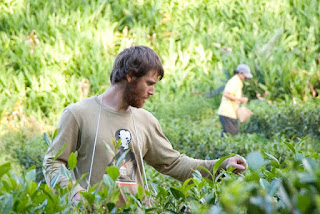Adopting and domesticating a Wild turkey chick
We found a wild turkey chick in tea field. One of our farm volunteers is now a foster mother. She is a vegan and don't eat meat so I assume that this bird is not for our thanksgiving turkey. Taka caught 3 wild turkey chicks about a year ago and domesticated them. He fed them and took a good care of the birds for about 3 weeks. These birds can actually fly at the age of 1 month or so and eventually they figured out that they could fly over the fence of their coop that they were in. About 4 feet high. One day Taka sow the turkeys walking in the tea field and immediately caught them again. After a while they took off and never returned. Then he found out that his neighbor across the street adopted the turkey for a while. The birds just walked right up to them. Taka wondered if they knew that the birds were domesticated at that time since they were such friendly wild turkeys. A few weeks later they released the birds, but were they thinking about keeping the turkey for thanksg...
